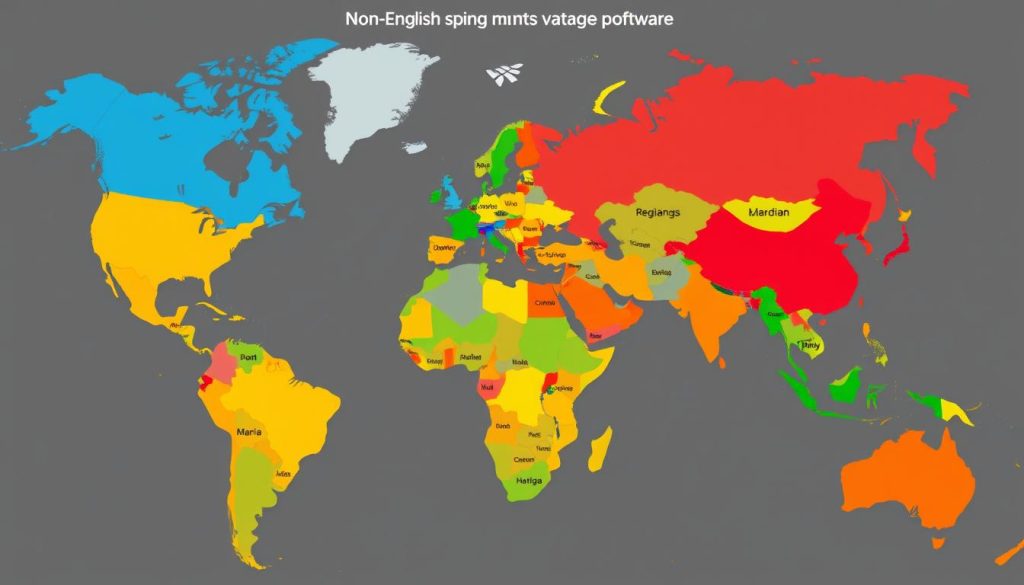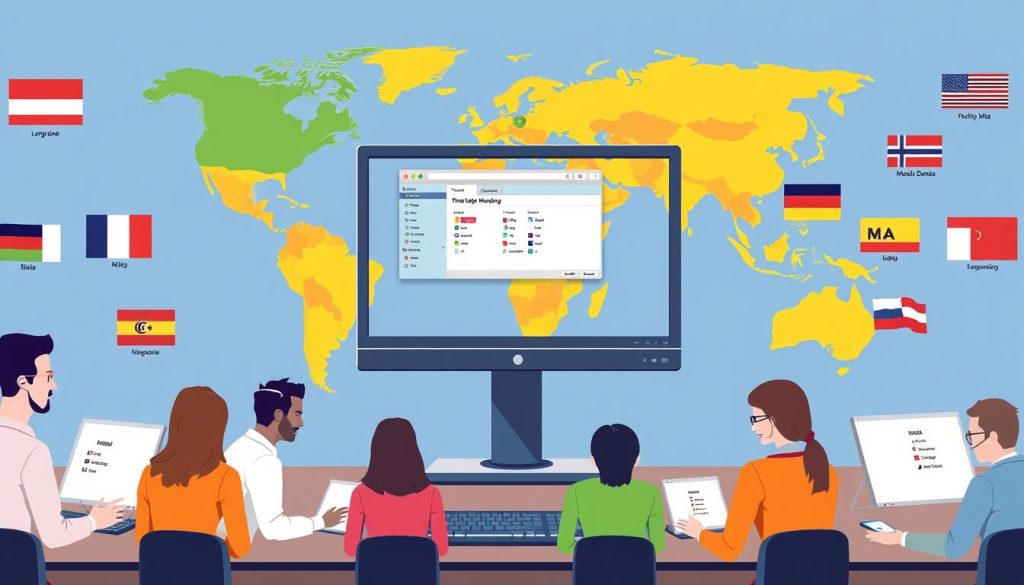Expanding your software business globally offers huge growth potential. Yet, it requires a smart strategy to overcome language and cultural barriers. Let’s explore how to effectively promote your software in non-English markets.
Key Takeaways
- Understand the importance of localization in reaching non-English speaking audiences
- Conduct thorough research to identify the most promising target markets for your software
- Build a multilingual website and create localized content to cater to diverse language preferences
- Leverage social media and online communities to engage with local influencers and thought leaders
- Partner with local businesses and resellers to expand your software’s reach in non-English speaking regions
Understanding the Importance of Localization
Software localization is key for success in non-English markets. It adapts your product to local preferences and expectations. Effective localization can make or break your software’s success in new regions.
Cultural Nuances and Preferences
Each market has unique cultural nuances in design and content preferences. Understanding these differences helps tailor your software to your audience. You may need to adjust the interface, graphics, or overall tone.
Language Barriers and Challenges
Language translation is more complex than just translating text. It involves idioms, colloquialisms, and linguistic variations. Professional language translation services can help overcome these challenges.
They ensure your software’s content is accurately conveyed to local users. This approach creates a natural experience for your target audience.
Software localization and cultural adaptation unlock your product’s potential in non-English markets. Addressing these factors creates an international user experience that resonates with your audience. This strategy drives business growth beyond language barriers.
Researching Your Target Markets
Thorough market research is vital before promoting software in non-English markets. Analyze industry trends and assess local competition. Determine your product’s viability in different cultural and linguistic contexts.
This process helps identify promising regions for global expansion. It allows you to make informed decisions about your strategy.
Identifying Potential Regions and Countries
Examine international software market analysis to find suitable markets. Look for regions with growing demand and stable economies. Consider market size, purchasing power, and digital adoption levels.
Research the competitive landscape in potential markets. Identify local and regional software providers. Understand their offerings, pricing, and marketing strategies.
Explore cultural and linguistic preferences of your target audience. Learn about their communication styles and digital behavior. This knowledge will guide your localization efforts.
| Region | Market Size | Digital Adoption | Competitive Landscape |
|---|---|---|---|
| Southeast Asia | $30 billion | 65% internet penetration | Fragmented with local players |
| Latin America | $25 billion | 70% smartphone ownership | Dominated by international brands |
| Middle East | $18 billion | 85% mobile broadband subscribers | Emerging with growing local startups |

Comprehensive market research and international software market analysis are key. They help identify your target audience. These steps support your global expansion strategy in non-English speaking markets.
Building a Multilingual Website and Content
A strong online presence for non-English audiences is crucial in today’s global marketplace. Businesses can expand their reach by developing multilingual websites. Multilingual website development and content localization need careful planning to ensure an optimal user experience.
User interface translation is vital for accurate communication with your target audience. This includes translating all textual elements, from menus to product descriptions. Optimizing digital assets for SEO in international markets can boost visibility in search results.
- Identify your target markets and the languages spoken in those regions.
- Hire professional translators or utilize translation services to accurately translate your website content.
- Ensure that your user interface, including navigation, forms, and calls-to-action, are fully localized.
- Optimize your website’s technical components, such as URL structure and metadata, for better search engine visibility in different languages.
- Continuously monitor and update your multilingual content to maintain relevance and accuracy.
A comprehensive multilingual website development strategy can help you reach non-English speaking audiences effectively. This approach positions your business for success in the global marketplace.
“A well-executed multilingual website can be a powerful tool for businesses seeking to expand their global footprint and connect with diverse customers.”
Translating and Localizing Your Software
Expanding your software to non-English markets needs careful translation and localization. This step ensures your product’s interface and documentation are accurately conveyed in the target language. It also adapts to local cultural nuances.
Hiring Professional Translators
Professional translation services are vital for software localization. These experts have the language skills to keep the intended meaning. They also understand the culture to adapt your content smoothly.
Look for translators who specialize in your industry. Choose those with a proven record of delivering high-quality, localized content.
Utilizing Translation Tools and Services
Modern translation tools can speed up the localization process. Neural machine translation can provide a solid base for your content. Linguists can then refine it for best accuracy and flow.
Using these tools with quality checks ensures polished localized versions. This approach prepares your software for target markets effectively.
| Feature | Professional Translation Services | Machine Translation Tools |
|---|---|---|
| Linguistic Accuracy | High | Moderate |
| Cultural Adaptation | High | Low |
| Turnaround Time | Slower | Faster |
| Cost | Higher | Lower |
Blend expert translators with efficient translation tools for best results. This mix creates a strong localization strategy. It helps your software connect with users in non-English speaking markets.

How To Promote Software In Non-English Speaking Markets
Expanding your software to non-English markets can boost your business growth. This strategy opens new revenue streams and connects you with diverse customers. Let’s explore effective ways to promote your software internationally.
Cross-cultural advertising is a powerful tactic. Create multilingual content that speaks to your target audience. Use professional translation services for accurate, culturally sensitive messaging. This approach helps build stronger connections with potential customers.
Establishing a strong online presence is crucial. Optimize your website for multiple languages. Make it easy for users to navigate in their native tongue. Use popular social media platforms in these markets to increase your reach.
| Promotional Strategy | Potential Benefits |
|---|---|
| Content Marketing | Establish thought leadership, build brand awareness, and nurture leads |
| Influencer Partnerships | Tap into established audiences, leverage social proof, and enhance credibility |
| Local Partnerships | Expand distribution channels, access new customer segments, and leverage local expertise |
Use a mix of promotion strategies to succeed in non-English markets. Stay flexible and mindful of cultural differences. Focus on providing a smooth, localized experience for your global customers.
Leveraging Social Media and Online Communities
Social media and online communities are powerful tools for promoting software globally. These platforms help businesses reach and engage target audiences across languages and cultures. They break down barriers and foster connections worldwide.
Engaging with Local Influencers and Thought Leaders
Collaborating with local influencers is key to connecting with non-English speaking audiences. These individuals have strong reputations in their communities. They’re invaluable partners for social media marketing for global audiences and cross-cultural digital engagement.
Building relationships with influencers can amplify your message and increase brand awareness. It helps you leverage influencer partnerships to navigate cultural nuances and language barriers. This approach drives product adoption in target markets effectively.
Online community building is another powerful strategy for global software promotion. Create vibrant communities on popular regional platforms. This fosters meaningful engagement with customers and gathers valuable feedback.
| Platform | Popular Regions | Key Considerations |
|---|---|---|
| China | Comprehensive platform for messaging, social networking, and e-commerce | |
| Kakao Talk | South Korea | Leading messaging app with strong social features |
| LINE | Japan | Widely used for messaging, social networking, and content sharing |

Social media and online communities help promote your software in non-English speaking markets. They foster connections and drive product awareness. These tools are crucial for accelerating your global expansion strategy.
Attending Industry Events and Conferences
Promoting software in non-English markets can be challenging. Attending industry events can be a game-changer. These platforms offer invaluable international trade shows, software conferences, networking opportunities, and cross-cultural business development.
Research is crucial for finding the right events. Look for relevant software conferences and international trade shows in your target markets. Focus on events that match your software niche and attract your ideal audience.
- Prepare thoroughly for the event by researching the attendees, speakers, and exhibitors. This will help you tailor your approach and make the most of the networking opportunities.
- Invest in eye-catching and multilingual marketing materials that showcase your software’s features and benefits. Ensure your branding is consistent and aligns with the local market’s preferences.
- Engage with attendees, speakers, and potential partners. Leverage the cross-cultural business development opportunities to build relationships and explore collaboration possibilities.
- Follow up promptly with any leads or connections made during the event. Maintain the momentum and continue nurturing these relationships for long-term success.
Strategic participation in events can boost your software’s global reach. It can unlock new growth opportunities in non-English markets. Building relationships at these events can lead to long-term success.
“Attending industry events is a powerful way to connect with potential customers, partners, and collaborators from diverse backgrounds. It’s an invaluable opportunity to showcase your software and explore cross-cultural business development.”
Partnering with Local Businesses and Resellers
Partnering with local businesses can boost your software’s reach in non-English markets. These alliances provide access to local channels, resellers, and co-marketing opportunities. Such partnerships can significantly increase your international presence.
Identifying Potential Partners
Look for companies who understand the local market deeply. These international partnerships can help navigate cultural nuances and language barriers. They can also provide insights into customer preferences.
The right partners can drive greater visibility and sales for your software. Consider attending industry events in target markets to network. Leverage your professional network for referrals or introductions.
Research online directories and industry forums for promising leads. Reach out to businesses that align with your product and audience.
- Attend industry events and conferences in your target markets to network and make connections
- Leverage your existing professional network to identify potential referrals or introductions
- Research online directories, trade publications, and industry forums to uncover promising leads
- Reach out directly to businesses and distributors that align with your product and target audience
| Partner Type | Benefits | Considerations |
|---|---|---|
| Local Resellers |
|
|
| Co-marketing Partnerships |
|
|
Carefully select and nurture local distribution channels and software resellers. This approach can unlock new opportunities for your software. It can help your product thrive in non-English speaking markets.

“Partnering with the right local businesses can be a game-changer for expanding your software’s reach in international markets.”
Offering Localized Customer Support
Exceptional customer support builds trust and ensures positive user experiences. This is crucial for non-English speaking markets. Software companies must invest in multilingual support teams to address cultural nuances effectively.
Building a Multilingual Support Team
A multilingual service team is key for international customer support. Hire support reps fluent in target market languages. This ensures smooth communication and cultural sensitivity.
Empower your team with linguistic and cultural knowledge. This optimizes the user experience and builds stronger customer relationships.
- Recruit support staff with proficiency in the target languages
- Provide comprehensive training on cultural norms and customer expectations
- Implement self-service options, such as multilingual knowledge bases and FAQs
- Leverage translation tools and services to bridge language barriers
- Continuously monitor and improve the quality of your localized support
A strong multilingual support team is crucial for success in non-English markets. It helps promote your software and build lasting relationships with global customers.
| Feature | Benefit |
|---|---|
| Multilingual Support Team | Improved communication and cultural sensitivity in customer interactions |
| Localized Knowledge Base and FAQs | Enhanced user experience and self-service options for non-English speaking customers |
| Continuous Quality Monitoring | Ongoing optimization of international customer support and service quality |
Adapting Your Marketing Strategies
Promoting software in non-English markets requires adapting marketing strategies to local preferences. Tailor your messaging, campaigns, and brand positioning to reach diverse audiences effectively. This approach maintains global brand consistency while resonating with different cultures.
Tailoring Your Messaging and Campaigns
Success in international marketing adaptation depends on understanding target market nuances. Research cultural differences, language barriers, and consumer preferences thoroughly. This knowledge helps craft cross-cultural messaging that aligns with audience values and expectations.
Consider these strategies when developing marketing campaigns:
- Localize ad copy, visuals, and media to reflect the target market’s cultural references and language
- Partner with local influencers, celebrities, or thought leaders to build trust and authenticity
- Leverage platforms and channels that are popular in the region, such as local social media networks
- Emphasize product features or benefits that are most relevant to your international customers
Tailoring your localized advertising approach creates campaigns that resonate with target audiences. This strategy effectively promotes your software in non-English speaking markets.
“Successful global marketing requires understanding and adapting to the unique preferences and behaviors of each market, while maintaining a consistent brand identity.”
| Strategy | Description | Benefits |
|---|---|---|
| Localize Content | Adapt marketing materials to reflect the language, cultural references, and preferences of your target market. | Increases relevance and resonance with local audiences, leading to higher engagement and conversion rates. |
| Leverage Local Influencers | Partner with popular influencers, celebrities, or industry experts within your target market to build trust. | Taps into existing audiences and leverages the influencer’s authority to effectively promote your software. |
| Optimize for Local Platforms | Adapt strategies to utilize popular social media, search engines, and digital platforms within your target market. | Ensures content and campaigns are visible and accessible to your target audience, improving reach and engagement. |
Conclusion
This article explored key strategies for promoting software in non-English markets. We discussed localization, market research, and building a strong multilingual online presence. We also covered diverse promotional channels and adapting marketing approaches.
With the right software globalization best practices, you can meet your international audience’s needs. This approach unlocks new growth opportunities and achieves remarkable multilingual marketing strategies. These insights provide a solid foundation for navigating global software promotion.
Embrace challenges and celebrate milestones as you expand your software’s reach. Keep exploring innovative ways to connect with international customers. This approach fosters lasting relationships with a diverse global community.
By implementing these strategies, you can become a leader in your industry. Remember, success in global markets requires ongoing effort and adaptability.




